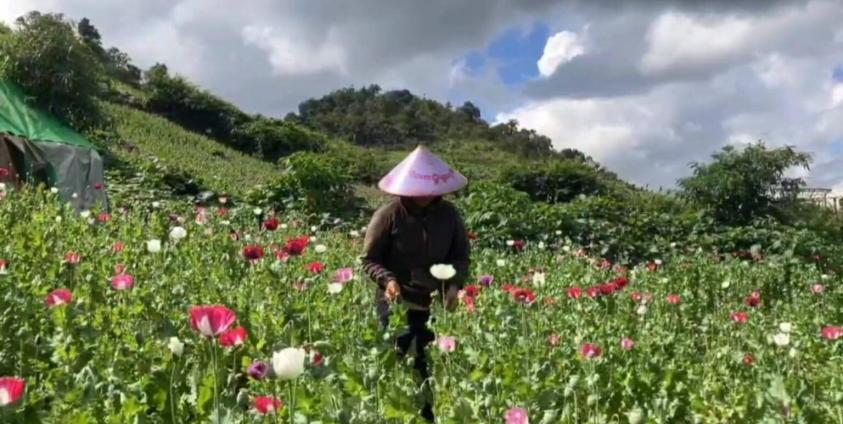Since the military coup in 2021, the cultivation of opium poppies has significantly expanded in Karenni State and the Shan-Karenni border area, according to local residents.
Residents report that not only in the mountainous areas but also in the lowland regions of Karenni, opium poppy cultivation has become more widespread.
“In the areas where poppies were already cultivated, there has been an increase in the number of cultivators. The size of the fields has also grown. We have also seen poppies being cultivated in lowland areas where they were not previously grown. The main reason for this increase is the need for survival during this period of scarce employment,” said a local resident from Dee Maw Hso township.
In the border areas of Shan-Karenni, such as villages like La Ei and La Tain in Pekon Township, poppy cultivation had declined during the NLD government era due to the collapse of the opium market.
Although other crops such as cassava were cultivated to replace poppy, since the military takeover in 2021, the opium market has rebounded, leading to a resurgence in cultivation.
Under the NLD government, the price of opium per viss (1.6 kg) was about 200,000 kyats. However, after the military coup, prices increased to between 700,000 and 1,000,000 kyats per viss.
The Interim Executive Council (IEC) stated that it is difficult to regulate poppy cultivation within a single state, as it requires nationwide coordination and international support to effectively manage the process. The IEC’s Executive Secretary, U Bayan, explained that they have not yet set up a process to address the current situation in Karenni State regarding on opium cultivation.
“This is a long-term process concerning the farmers. Since it involves alternative crops, rather than taking immediate action, we are striving to better understand the situation. We will continue to gather more information. Based on that, we will gradually explore the potential for transitioning to alternative crops and other viable economic sectors,” said U Bayan.
According to the UNODC’s Myanmar Opium Survey report released on December 12, 2024, while poppy cultivation has decreased nationwide, Myanmar remains the largest producer of opium in Southeast Asia.
In Karenni State, poppy cultivation has increased by 8% in 2024. Shan State has the highest level of poppy cultivation in the country, accounting for 88% of the total.
After the military coup, both local residents and displaced persons have engaged in poppy cultivation as a means of livelihood, according to displaced individuals.
The IEC, which operates under a transitional government, has stated that while it does not include poppy cultivation in its special law enforcement program, it will take effective action against drug use and trafficking.







